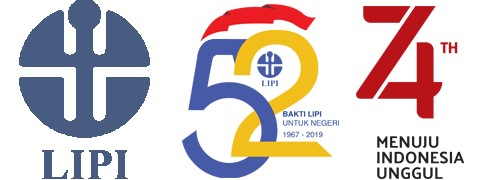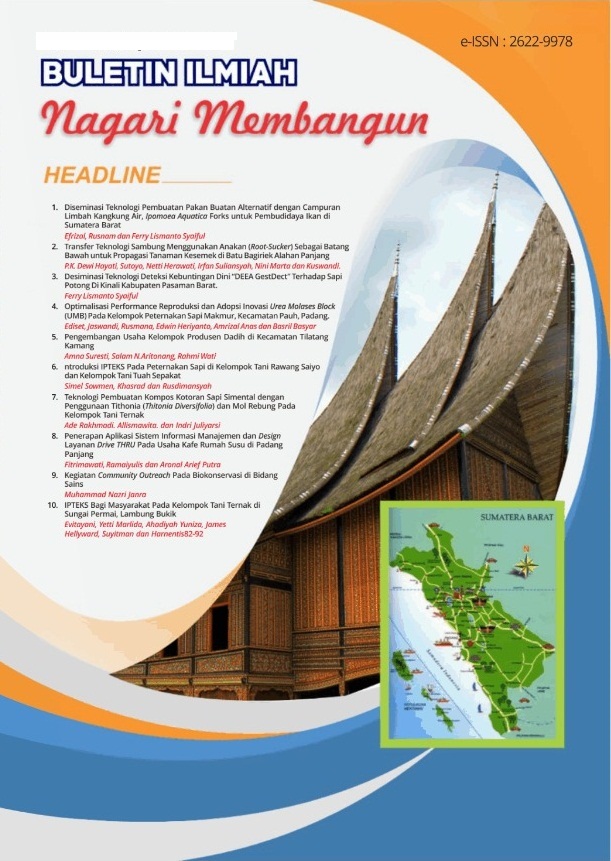EDUKASI KESEHATAN PADA IBU HAMIL PADA MASA PANDEMI COVID-19 DI RW III KELURAHAN PAMPANGAN NAN XX KOTA PADANG
Abstract
The class for pregnant women is a place to increase knowledge, attitudes, and behavior of mothers during pregnancy. Currently the world is facing the Covid-19 pandemic caused by the Severe Acute Respiratory Syndrome Coronavirus-2 (SARS-CoV-2). The current condition of the Covid-19 pandemic has caused the mother's class activities to not be carried out properly. Health services must continue to run optimally, safe for patients, health workers including midwives. This activity aims to create a complete understanding in all sectors regarding maternal and child health services with preventive and promotive efforts through organizing, community empowerment and empowering women in the community. The method used is a mixed method, descriptive qualitative and quantitative by means of in-depth interviews and surveys conducted boldly (WA Group for pregnant women, and Via Phone, Video Call/SMS). The results of 6 pregnant women in RW III, it was found that 100% of pregnant women had never attended classes for pregnant women during the Covid-19 pandemic, and 100% of pregnant women were worried about pregnancy during the Covid-19 pandemic. Interventions were carried out in the form of advocacy to the puskesmas and midwives of supporting health centers, as well as empowering health cadres in carrying out classes for pregnant women by utilizing online technology via WhatsApp groups, Zoom Meetings, Video Calls and the Tiktok application. It is hoped that cadres will play an active role and collaborate with midwives and health workers in terms of providing health information, especially those related to the health of pregnant women by utilizing online media, so that the health of pregnant women is monitored during the COVID-19 pandemic.
Downloads
References
Bustami., dan Insani, D. 2017. Buku Ajar Kebidanan Komunitas. Penerbit Erka.
Ekawati. dan Rany. 2020. Program Kesehatan Reproduksi Indonesia. PT. Wineka Media.
Femelia, W., dan I. Purnakarya. 2020. Tanggulangi stunting: edukasi kesehatan pada ibu hamil, ibu menyusui dan ibu balita di Nagari Parit, Pasaman Barat. Warta Pengabdian Andalas, 27, 87–94.
Huang, C., Wang, Y., Li, X., Ren, L., Zhao, J., Hu, Y., Zhang, L., Fan, G., Xu, J., Gu, X., Cheng, Z., Yu, T., Xia, J., Wei, Y., Wu, W., Xie, X., Yin, W., Li, H., Liu, M., … Cao, B. 2020. Clinical features of patients infected with 2019 novel coronavirus in Wuhan, China. The Lancet, 395(10223), 497–506. https://doi.org/10.1016/S0140-6736(20)30183-5
Kebidanan, J., F.I. Kesehatan, dan U.B. Tarakan. 2021. Kelas ibu hamil pada masa pandemi covid-19. 51–56.
Lau, L. S., Samari, G., Moresky, R. T., Casey, S. E., Kachur, S. P., Roberts, L. F., & Zard, M. 2020. COVID-19 in humanitarian settings and lessons learned from past epidemics. 26(May), 647–648. https://doi.org/10.1038/s41591-020-0863-y
Sumarni. 2017. Model sosio ekologi perilaku kesehatan dan pendekatan continum of care untuk menurunkan kematian ibu. The Indonesian Journal of Public Health, 129-141.
Wahyuni, E. 2018. Bahan ajar kebidanan: Asuhan Kebidanan Komunitas. BPPSDMK Kementerian Kesehatan RI, Jakarta
WHO. 2019. Maternal mortality. Dipetik 07 26, 2021, dari World Health Organization: https://www.who.int/news-room/fact- sheets/detail/maternal-mortality.




















